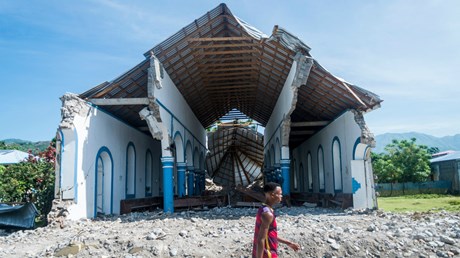Christian leaders in Haiti share what is different for believers between 2010 and now, as death toll passes 1,400.

Last month, Haitian president Jovenel Moïse was assassinated. On Saturday, a 7.2-magnitude earthquake struck the Caribbean country, leaving more than 1,400 people dead and thousands more injured and displaced from their homes.
The earthquake drew comparisons to the 7.0-magnitude tremor that hit the island in 2010, killing more than 300,000 people according to the Haitian government and injuring nearly as many. In its wake, Haitian theologian Dieumeme Noelliste told CT in 2010 he didn’t expect that crisis would lead his people to forsake their faith:
This is not the first time that disaster has come to us. This may be the most brutal, but two years ago we had four devastating hurricanes and even then the people didn’t turn against God. They’ve suffered many things at the hands of fellow Haitians and remained fast to God. Even during slavery, Haitians were treated brutally but open to the version of Christianity that the slave owners were preaching. The slaves were even asking for more! I see the church continuing to grow. In these situations people tend to turn to God. This is their only hope.
More than a decade after the first earthquake, what has changed for Haitian Christians now facing the aftermath of a second devastating tremor? Amid such hardships, have they kept the faith, and how?
CT asked Haitian church leaders and missionaries to share what they’re seeing on the ground, including:
- Edner Jeanty, executive director, Barnabas Christian Leadership Center
- Lesly Jules, apologist and author, Objections Rejetées: L'Approche Apologétique Classique
- Luke Perkins, assistant to the president, Séminaire de Théologie Évangélique de Port-au-Prince
from Christianity Today Magazine
via


.gif)

.gif)
.gif)
